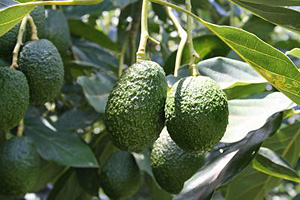 |
 |
 |
 Business News | February 2007 Business News | February 2007  
Official Says NAFTA Helped Both Nations
 S. Lynne Walker - Copley News S. Lynne Walker - Copley News


| | Mexican trucks laden with avocados headed north to the border on Friday, marking the final elimination of a decades-old U.S. ban on imports of a fruit that plays a central role in Mexican cuisine. |
U.S. Commerce Secretary Carlos Gutierrez yesterday urged the Mexican government to expand trade with the United States, saying the North American Free Trade Agreement has helped grow the economies in both countries.

Gutierrez pointed to the opening of California's avocado market as an example of the U.S. commitment to trade with Mexico.

A 93-year ban on Mexican avocado exports to California ended yesterday, and Gutierrez planned to tour an avocado-producing region in Michoacan state today at President Felipe Calderón's invitation.

Opening the avocado market “shows our commitment to open and free markets,” Gutierrez told journalists before addressing the American Chamber of Commerce of Mexico. “That's the message that we're taking around the world.”

The U.S. sugar market will open to Mexican exports next year, while Mexico will open its corn and bean markets.

For Mexico, allowing corn imports is politically risky. Mexicans regard corn as a cultural crop that was first cultivated in their country 9,000 years ago.

The agreement on corn was even debated during the presidential campaign, with leftist candidate Andrés Manuel López Obrador vowing to renegotiate the issue with the United States if he was elected.

Gutierrez offered recent statistics as proof that the trade agreement benefits both countries. U.S. exports to Mexico have increased 190 percent since the free trade agreement went into effect on Jan. 1, 1994. The United States exported more than $124 billion worth of goods to Mexico last year.

Mexico's exports to the United State have increased 326 percent under NAFTA, to at least $183 billion in 2006.

As the two countries work to strengthen trade, Gutierrez said the United States must pass comprehensive immigration reform that acknowledges the need for Mexican workers.

“We have jobs in the U.S. that are available, that are not being filled by Americans. We have to fill those jobs. We are better off recognizing that – we have to fill those jobs in a legal way,” he said.

“Amnesty is one extreme, but the other extreme is the assumption that we are somehow going to round up 12 million people and deport them. That's not . . . logistically realistic and it's not humane or moral. So the solution is in the middle, and it's going to require a lot of compromise, a lot of discussion, a lot of debate. But unless we tackle the problem in a comprehensive fashion, it's just going to get worse.”

S. Lynne Walker: slwalker@prodigy.net.mx
Mexican Avocados Finally Head to Calif, Florida
Reuters

Mexican trucks laden with avocados headed north to the border on Friday, marking the final elimination of a decades-old U.S. ban on imports of a fruit that plays a central role in Mexican cuisine.

Hundreds of locals in the western town of Uruapan, Mexico, waved at two trucks carrying Hass avocados bound for California and Florida, which along with Hawaii were the last states to lift a ban put in place at the start of the 20th century, ostensibly to prevent plant disease.

The ban has been gradually lifted since 1997 when Mexican avocados, the base for guacamole dip, were first allowed into some states.

Mexico, which is a close trade partner of the United States under the 1994 North American Free Trade Agreement, is the world's biggest exporter of avocados.

While Mexican producers were delighted at being able to export to the entire United States, Thursday's final lifting of the ban was too late to let Americans use Mexican avocados in guacamole popular during Super Bowl football game festivities on Sunday. | 
 | |
 |



